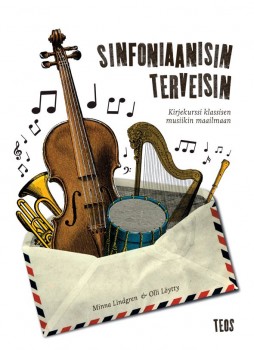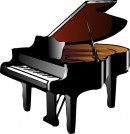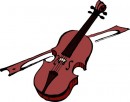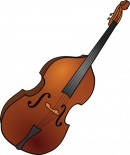Rock or baroque?
30 April 2014 | Extracts, Non-fiction
 What if your old favourites lose their flavour? Could there be a way of broadening one’s views? Scholar Olli Löytty began thinking that there might be more to music than 1980s rock, so he turned to the music writer Minna Lindgren who was delighted by the chance of introducing him the enormous garden of classical music. In their correspondence they discussed – and argued about – the creativity of orchestra musicians, the significance of rhythm and whether the emotional approach to music might not be the only one. Their letters, from 2009 to 2013, an entertaining musical conversation, became a book. Extracts from Sinfoniaanisin terveisin. Kirjekurssi klassisen musiikin maailmaan (‘With symphonical greetings. A correspondence course in classical music’)
What if your old favourites lose their flavour? Could there be a way of broadening one’s views? Scholar Olli Löytty began thinking that there might be more to music than 1980s rock, so he turned to the music writer Minna Lindgren who was delighted by the chance of introducing him the enormous garden of classical music. In their correspondence they discussed – and argued about – the creativity of orchestra musicians, the significance of rhythm and whether the emotional approach to music might not be the only one. Their letters, from 2009 to 2013, an entertaining musical conversation, became a book. Extracts from Sinfoniaanisin terveisin. Kirjekurssi klassisen musiikin maailmaan (‘With symphonical greetings. A correspondence course in classical music’)
Olli, 19 March, 2009
Dear expert,
I never imagined that the day would come when I would say that rock had begun to sound rather boring. There are seldom, any more, the moments when some piece sweeps you away and makes you want to listen to more of the same. I derive my greatest enjoyment from the favourites of my youth, and that is, I think, rather alarming, as I consider people to be naturally curious beings whom new experiences, extending their range of experiences and sensations, brings nothing but good.
Singing along, with practised wistfulness, to Eppu Normaali’s ‘Murheellisten laulujen maa’ (‘The land of sad songs’) alone in the car doesn’t provide much in the way of inspiration. It really is time to find something new to listen to! My situation is already so desperate that I am prepared to seek musical stimulation from as distant a world as classical music. I know more about the African roots of rock than about the birth of western music, the music that is known as classical. But it looks and sounds like such an unapproachable culture that I badly need help on my voyage of exploration. Where should I start, when I don’t really know anything?
My desire to know more about western music was lent wings by, on the one hand, an interest in a phenomenon that has remained foreign to me, and on the other by my tendency to pursue originality. What clearer way could there be to distinguish myself from the now conventional belief of my generation in the authenticity and primal power of rock music than to take an interest in genteel salon music. I might also secretly have imagined that a light touch of elitism could bring some so-called edge to my bland, middle-aged habitus. After a film I could surprise my friends by expressing expert opinions on how well the A major preludes to Beethoven’s thirteenth violin concerto framed the main character’s fumbling attempts to find a place in society.
Minna, 11 May, 2009
Dear correspondent,
I was delighted by your letter. The kind of curiosity you show is the foundation of the healthy human mind. We are not meant to tread water. As you noted, the preferences of rock people are often nostalgic. I myself am surprised by sentimental feelings in unexpected occasions – they may be brought on by Abba or Hurriganes. I may get completely carried away into a party mood, embarrassing my children, when the radio plays CCR or disco hits from the 1980s.
I am sincerely of two opinions: 1) it would do anyone at all good to get to know classical music and 2) no one has to like it. Before one can express a categorical negative (‘I don’t like classical music’) it would be advisable to find out something about the thousand-year history of western civilisation to which the statement refers. Mere curiosity is a sufficient starting point, and you seem to have that. It looks to me as if snobbishness has been left behind by the thirst for knowledge and curiosity. Congratulations!

French horn. Wikimedia
Music is mostly a matter of liking. You like Telemann’s concertos better than Rameau’s music, and in Telemann the flutes speak to you more than the trumpet and the clarinet. For many people this kind of knowledge is enough. Music that doesn’t appeal is avoided. What about the music that you like? Often it’s consumed to the end, to the point of boredom.
In this, classical music is supreme among genres. It’s hard to consume to the end. Brahms’s Fourth Symphony is listened to by a connoisseur and a first-timer side by side, and both can have a great experience. These listeners probably direct their attention to quite different aspects of the music, and derive their experiences differently. This does not mean that one experience is better than the other. An experienced listener can nevertheless ‘understand’ more of what they have heard, with the result that they construe what they have heard differently. But even this does not indicate superiority. On the contrary, many big consumers of classical music have an over-analytic attitude to music, and it taxes exaltation. One think is certain: there is no right or wrong way of listening.
Olli, 1 October, 2010
I was very disappointed by the way you disregarded rhythm as something that is not important in classical music. I don’t want the same thing from classical music as from rock; the whole point of this correspondence course, after all, is to broaden my understanding of music! Now, then, I’m waving and shouting from my desk: classical music is rhythmical! I refuse to believe your claim that ‘if rhythm has any importance in classical music apart from pulse, it is subordinated to an intellectual function’. (There’s that ‘intellectual’, again!)
Let me try to put my questions concerning rhythm into words once more. I will begin with an illustration: my brother, who plays bass in a rock band, once enlightened me on the effect of mechanical beats on music. According to him, music becomes somehow lifeless when, in the studio – and, increasingly often, in live performances – the drummer listens to an exact beat through his headphones. In the blues aesthetic (which my brother probably considers his ideal) that kind of even beat flattens expression. Without it an orchestra will produce, as of itself, slowings down and speedings up, which are themselves an important part of musical expression. So no performance can be identical to another.

Metronome. Wikimedia
I would have thought that in western music the deal would not be that every bar should last exactly the same time (the leader of the orchestra, in other words, does not listen to the ticking of a metronome through his headphones). If so, is the slowing down or speeding up of rhythm or pace not an important part of classical music? Somewhere I have also read that the speed of performance has, generally speaking, increased with time, so that orchestras now play faster than before? Is this of no importance?
Now that I think in more detail: am I somehow muddling up the concepts of rhythm and pace? Can there be completely arrhythmic music? In any case, I would like to have more clarification on this matter of rhythm.
And if you have the energy, it would be interesting to hear more about this Stravinsky. I didn’t completely buy your claim that The Rite of Spring is not beautiful music. Beautiful doesn’t need to mean harmonious, after all, does it?
Minna, 11 October, 2010
‘Intellectual’ annoyed you. You reacted emotionally to Beethoven, and it didn’t hit the spot. So I tried to emphasise to you as a university man that different approaches can enrich one’s emotional life and that it generally makes sense to seek more than feelings in art. I also hurried to add that everyone can make their own approach to art. I sincerely believe this.
I believed that your desire to find out more about classical music was a matter of the deepening of feeling and the increase of knowledge. For some reason I nevertheless sense a little belligerence about this correspondence, as if I represented something you had to oppose.
Before I attempt to reply non-intellectually to some of what I feel to be your excellent questions, let me give you something to think about. Why are you interested in classical music? What kind of expectations do you have of classical music? How do you want to use it? In what sorts of situations? What do you think you need it for? What is it about it that interests you?
….And then to rhythm, which is a big subject. Bars are the way the human urge to order limits, defines and describes rhythm. Bars govern certain things in a given frame with respect to rhythm. ‘In this house there lives a family of semibreves, a father, mother and two children,’ I was taught in the name of progressive pedagogy in the 1970s.
Then there is impact, pulse, beat and tempo. And all sorts of other things. I called the rhythm of classical music intellectual when it does not have a subordinated position and when it is complicated – difficult consecutive or simultaneous rhythmic figures whose calculation brings composers pleasure, players grief and listeners seldom great joy, because the information is hard to take in. I am speaking here principally of modern concert music, which has often accorded more importance to rhythm than to melody.
There is rhythm in almost all music. I have tried to think of arrhythmic music, and all that comes to mind is a shapeless cacophony or something so static that it is hard for a western person to detect a pulse. But an Indian sage could no doubt lecture about a pulse that is divided over many hours.
In light music, rhythm is constant. There are generally four beats to a bar and a piece is typically played at the same tempo from beginning to end. Different rhythms are not muddled up, superimposed, and time signatures are not often changed in the middle of a piece. Pauses, too, are rare. At the mixing desk, rhythms are emphasised: drums and bases are turned up so loud that even deaf people can dance according to the vibration of the floor.
Rhythm does not have this kind of meaning in classical music. The kings of rhythm are in jazz, and that is where I have heard the interesting idea that there is no rhythm in classical music. It is a provocation, of course, but as in all good provocations, there is a grain of truth in it.
Stravinsky’s The Rite of Spring took rhythm as its main subject, despite which the music is beautiful, as you commented. In the 1910s melody was so central to the concept of beauty that Stravinsky’s idea was scandalous. He did not strive consciously for the beauty that was the predominant concept of beauty. The work is composed as a ballet and the first performance was visual in the extreme, in choreography, mise-en-scene and costume. In other words you were on the same wavelength as the composer when you heard The Rite of Spring as visual. It would be great if you listened to more Stravinsky, as The Rite of Spring is a thin page in his work. But which direction should you go in?

Grand piano. Wikimedia
To my understanding, your favourites so far have been Telemann’s concertos and The Rite of Spring. Big romantic orchestral music is perhaps not so close to your heart. You could, nevertheless, try Jean Sibelius. I recommend symphonies number 5 or 7, the Kullervo symphony from the third movement to the end, the violin concerto, the music to Shakespeare’s The Tempest or, why not, Finlandia, although it may be very familiar. It would nevertheless be interesting to hear your thoughts on it too
What about chamber music, in other words music for small groups? Or piano music? How about listening, just for the hell of it, to Frédéric Chopin’s piano pieces? For example his etudes, waltzes, mazurkas or nocturnes. Or is the leisure music of 19th-century gentlewoman too far from your world? A more robust alternative is offered by Edvard Grieg’s piano concerto – I simply demand that you find the version played by Olli Mustonen, as it’s full of creative freedom. The same disc offers a free and masterly performance of Chopin’s concerto.
Olli, 11 February, 2011
It looks as if there’s a 19th-century gentlewoman living inside me! These Chopin nocturnes are real ear candy. I know one of them, the piece called ‘E flat major – mi bémol majeur – Es-dur. Op 9 no. 2.’ I’m listening now to the recording I borrowed from the library, with Vladimir Ashkenazy playing the piano.
For certain extra-musical reasons this letter has been unforgivably delayed. With my fictive hat in my hand I nevertheless beg you to allow me the opportunity to continue my studies with you. When I read over my earlier letters, I realised that I need to pull my socks up. I don’t exactly know myself why that intellectualism irritates me so much. Why it’s so difficult to combine with listening to music.
I admit freely that both you (as an expert, not as a person) and classical music as a whole represent to me the kind of high culture and elitism which my friends have always thoughtfully warned me against. But as I think I remember remarking at the beginning of our correspondence course, I’ve become tired of such oppositions. You ask, why and what for I need classical music, why it interests me. I could perhaps condense the answer into two points. First there is curiosity, or the desire to understand. Then there is the life-long search for enjoyable sensations. And one should think about why it is in general that people need music. It is, after all, something strange and enchanting, the fact that sounds arranged in various ways should have such a strong effect on body and mind.
Minna, 14 March, 2011
I was so pleased with your letter that I couldn’t reply to it straight away. I had reproached myself for a long time, for I believed that my schoolmarmish attitude was killing the sprouting buds of your curiosity about classical music. But the fact that Chopin’s ‘E flat major – mi bémol majeur – Es-dur. Op 9 no. 2’ touched you like a 19th-century French gentlewoman – that humbles me.
One important part of live music is virtuosity. By live I mean that the audience is present at the musical performance. On the light music side, and in life in general, this is becoming increasingly rare. Some time ago I participated in a debate arranged by Helsingin Sanomat’s Nyt supplement, in which representatives of different musical genres pondered the ideal food pyramid for music. We talked with great enthusiasm, and eventually the editor asked what music we were going to listen to next. I said I was going to a Mozart concert by the Helsinki City Orchestra. Verneri Pohjola, for his part, confided that he was going to some club to listen to some jazz buddy of his. Then the others exclaimed: ‘A concert! Wow, we never even thought of that!’

Violin. Wikimedia
And so we come to the Sibelius’s Violin Concerto. Among the reasons for its being the best violin concerto in the world (and the most often recorded single concerto) is the fact that it combines dazzling virtuosity with profoundly gripping expression.
According to Sibelius, the concerto’s final, or third, movement must be played with ‘schwung’. Listen to that last movement. I do not know whether it will satisfy your expectations of swing. But swing and schwung belong in the same sentence.
Olli, 13 April, 2011
One of my pieces of homework was that Violin Concerto, which I have indeed listened to a great deal – and willingly. I even believe I have heard the beginning before.
The capable staff at the Tampere Metso city library gave me two versions. At this moment I am playing Osmo Vänskä conducting the Lahti City Orchestra. On the cover of the disk is an introductory text by Antti Häyrynen, which says, among other things: ‘The massive tutti phrases are dosed naturally on the solo pages and the strings flow in rugged tones below the solo violin.’
Tutti phrases notwithstanding, I like it a lot. Why has no one told me about this Sibelius guy? The man’s a real composer!
Minna, 6 May, 2011
I catch my breath when I hear you wonder why no one has told you about this Sibelius guy. You can’t have avoided this guy, no way, you lived in the time when he appeared on the one-hundred Finnmark bill, which you might even have seen in the hand of some of your friends! And otherwise. There are still sexually mature Finnish composers walking about who feel that there isn’t room in Finland for any other composers but Sibelius. That this unsurpassable giant casts his shadow of the whole of Finland’s musical life. That always when Finnish music is discussed, only Sibelius is discussed. And when Finnish music is played, it can only be Sibelius. People are saturated with Sibelius while they’re still at school. But you’re fortunate – that hasn’t happened to you!
I can recommend all of Sibelius to you. For here is a man who was not failed by self-criticism. That is why he composed his major works again and again, forbade performances by inferior musicians and gave up composing when he could no longer do it better than before. That, by the way, is one of the central symptoms of creativity: the desire always to do better than before. Today all of Sibelius’s youthful sketches are played – as well as the Kullervo symphony, which he forbade – as if they were central to the concert repertoire, but if you want to respect the composer’s judgement, you should only listen to the works contained within his list of works.
Olli, 31 July, 2012
I’ve made a general observation in getting to know Sibelius’s Violin Concerto, and that is that I have begun to enjoy musical wager. At the point in our course where when we were moving on from the baroque period toward newer and louder symphonic stuff, I thought I would never learn to like the grandiose manoeuvres of big orchestras. My taste has subsequently changed. Now that I know all the twists and turns of this violin concerto I’m able to anticipate the louder passages and (when I’m alone) conduct the heavenward-soaring sound mass with the wide hand- and hair-sweeps of a conductor.
Minna, 18 September, 2012
I’m sorry, but I cannot but comment on your nonsense about the age-structure of concert audiences. It was just so absolutely and completely typical. As long as I can remember, people have been worried about the high average age of opera and classical music audiences. You too immediately got yourself into a pother about the art form’s future. Why? Haven’t you noticed what is happening in your own case? You’ve listened to rock all your life, but as you approach 50, you start to be interested in classical music. In no time at all you’re taking your wife to a concert. I wouldn’t be surprised if, in 20 years’ time, you had a season ticket to the Tampere City Orchestra’s concerts. There you will horrify younger people because your mere presence means that some kind of extinction is in progress.
I truly believe that people do different things at different ages. At 15, I read all sorts of teen magazines, but I don’t do it any more. Even my eating habits are different now from twenty years ago, when I was a 30-year-old singleton dedicated to work. Classical music demands time, trouble and peace. We don’t have that at all times of our lives. These sorts of things begin to interest many people only at your age. But there always also children, young people and people of all ages who take an interest in classical music. There is so much of it and it can be approached in so many different ways that there is something for every age-group to find its own object of interest. As a child I played myself, at 25 I listened mainly to contemporary music and music composed before 1700, ten years later chamber music and now, suddenly, opera. I consider this entire genre unusually open to all ages. If you look at whatever other musical genre’s audience, it will probably represent a far narrower age sector than the people at Tampere City Orchestra’s concerts.
And there is another thing I would like so say: there is no audience I value more highly than that which is called old. When people have age, experience, time and thoughts, they apply themselves to things in a completely different way from the eternally young, trendy hedonist who wants the most extreme vibes possible, here and now. I began work at the Finnish Radio 1 channel as a classical music editor at the age of 23. I have always been told I am the wrong age, in other words too young, and only now, on the threshold of my fifties, am I gradually beginning to conform to the clichés of the classical music-lover. And like you, I too enjoy, day after day, the fact that when I go to the opera I feel comparatively young. It is, of course, a mere illusion. If some 17-year-old were to see you on Friday at the Tampere Hall or me sometimes at the opera, he or she would not be able to tell us apart from the generality of fossils.
Minna, 15 February, 2013
Because I am someone who loves effort, I was moved to tears when a hard-working, solitary Tampere student of mine wants to get to know Alban Berg’s violin concerto better and is annoyed that he didn’t find out more about the piece before the concert. I suppose it has to be admitted that a lot of classical music demands a great deal of active participation from the listener. Therein lies its charm, but also its curse. And at the same time it is necessary to add immediately that this genre also contains a great deal of music that is innocuous and easily approachable, which works as background entertainment – if you want it to.
I hope you and your wife will hurry to the Tampere Hall concerts more and more often. The more often you go, the better you will be able to concentrate on the essential, and perhaps one day you will relax enough so that you will not continually bother yourself with big questions. Or, even if you do, you will return to them after the concert and decide them by listening more. A concert can also be an effective form of meditation. I have solved many problems of work and everyday life sitting in a concert. You don’t always have to experience something extreme. With all art, you also have to dare to not like what’s offered, however fine it may be in the opinion of experts. I just went to the opera, and was frankly delighted when the work that was being performed was altogether boring and bad. It was in its own way refreshing to have to spend a long evening justifying to myself why I didn’t like Jules Massenet’s opera Thaïs. It made me think again about what I love in opera and why. Have I remembered to say that a little nap during a long opera or concert is not in the least bad manners.
Olli, 30 March, 2013
Yippee, no more homework!
But seriously, I’m beginning to have the feeling that I have made a kind of peace with this main opponent of mine, or listening to classical music. I’m no longer troubled by a continual feeling of the incompleteness of my listening experience or the fact that I cannot be sure what I should be able to hear in music. I still don’t know enough to be able to make a convincing judgment of the strengths and weaknesses of a musical performance, but I do know enough to enjoy music freely without the disturbing consciousness of my outsiderness. The strangeness has dispersed. I am on speaking terms with my own ignorance concerning western art music.
We have spoken on many occasions of the understanding of music. Through our correspondence, I have begun to understand that the understanding of music is not a matter of cracking of some secret code, but of empathy – I can’t for the life of me think of a better way of saying it. By empathy I mean that you listen to music in its own terms, not directed by your own prejudices.
Olli, 7–12 August, 2013
A couple of days ago I stood, along with fifteen thousand other fellow creatures, in the Kaisaniemi park listening to a band called Neil Young & Crazy Horse. The concert restored by belief in rock music. On the stage, in front of the drum kit, stood three geezers in their sixties in a small circle, like the smiths of The Three Smiths’ statue [in front of the Old Student Housein Helsinki], beating out into the air an astonishingly nuanced but powerful sound experience which I would unhesitatingly describe as both symphonical and symphonic. Although the orchestra’s music derive, among other things, directly from the garage band tradition, which is known for its directness, it is not simple, unanimous or boring.
It may be a result of this correspondence course that I noticed that I was analysing the music… yes, intellectually. I heard in it layers, themes, structures, nuances. I attached attention to both vertical and horizontal structures. I interpreted the over-long endings to pieces – the sound-storm that precedes the final beat could last for minutes – as rock’s habit of playing with conventions. Although the music performed by Young and company was in many ways genre-conscious, it also broke its own performance traditions by extending the pieces to great lengths. The opening number lasted as long as 16 minutes and the vocal part began at the five-minute mark (or so I was told on the way home in the train by a friend who had followed the course of events with a watch).
When, after the concert, I offered my analyses to a self-confessed Neil Young friend of mine, he said curtly, that he could not really participate in the conversation as he approached Young’s music so emotionally. Hmm.

Double bass. Wikimedia
When I set out on this project, I think what I found most suspicious about classical music was its formality and the resultant superficiality. I suppose I felt the ideal was that musicians should make their own personal contribution to the end result and that an orchestra with its individual players should be in this sense a creative part of the work as a whole. The idea of musicians as machine parts playing their notes with rigorous accuracy was horrifying. Before our correspondence I would have been prepared to take to the streets in favour of the liberation of classical musicians, but now I have begun to understand how relative a matter the creativity of musicians is.
Throughout our conversation, I have tried to create, in listening to music, a new class in my classification system in which classical music can flourish in peace without pressures on content and form derived from other musical genres.
Now, as a coda, I’m searching YouTube for Richard Strauss’s divinely beautiful Metamorphoses for 23 solo strings and write a ceremonial full stop to our correspondence. To be on the safe side, I do it three times…
Translated by Hildi Hawkins
Minna Lindgren & Olli Löytty
Sinfoniaanisin terveisin. Kirjekurssi klassisen musiikin maailmaan
[With symphonical greetings. A correspondence course in classical music]
Helsinki: Teos, 2014. 272 pp.
ISBN 978-951-851-532-9
Tags: music
No comments for this entry yet
